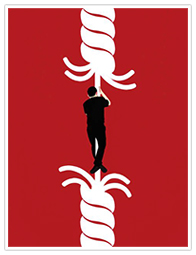No doubt, this is the 21st century and we need to be moving fast so as to stay aware of the fast pacing culture. We live in a day and age where constant demands are thrown upon us every day. Everyone seems to be running as fast as they can to achieve a goal, accomplish a dream or climbing the heights of achievements.
On the off chance that you completely have no essence of this new kind of season, you are passing up a major opportunity for a great deal (or so we think), and it essentially is viewed as an indication of being lackadaisical. To top it off, a loaded message gets thrown around that we are simply NOT doing enough, being enough, moving enough, knowing enough and earning enough! Society and culture constantly impress upon us to GET more and BE more.
A story is recounted of a fisherman who one day was seen paddling a small boat towards the shore after catching a few fish. A businessman who happened to be on the shore attempting to unwind from his taxing work saw his efforts and asked, “How long did it take to catch these fish?” “Oh, just a short while” replied the fisherman. Curious, the businessman asked, ““Why not remain at the sea longer to catch some more?”
The fisherman said, “This is enough to feed my whole family”. Amusingly, the businessman asked,” What do you do the rest of the day then?” to which the fisherman said, “Usually, I go home, play with my kids and spend time with my wife and in the evening I come out here to relax with my friends.” Astonished, the businessman replied, “Well, you are not going to make much of that. You should be staying longer in the sea and catching some more fish”. “But then what will my reward be?” the fisherman asked.
Dumbfounded, the businessman replied, “Well, you can buy a bigger boat that would contain more fish and when your business grows in the long run, you employ more people who will catch more fish for you” The fisherman inquired, “And after that what will my reward be?” Somewhat annoyed at this point that he had to clarify the obvious, the businessman replied, “well, you can profit out of that, build a bigger house, retire early and then you can spend all the time in the world with your kids and family and relax at the seashore and enjoy your life.”
The fisherman smiling looked up at him and asked, “Isn’t that what I am doing now?”
Having a LOT is considered to be requisites for gaining respect and happiness. We work hard; ruin our health to acquire more wealth with the goal of amassing more things that are presumed to bring us happiness. In the process, we end up spending even more energy and time in storing, maintaining, cleaning and taking care of these things, only to discard them later.
All that energy, time and stress at the cost of good health for a little respect and popularity is squandered when we could have been happy all along without carrying all that stress. Bigger and better perhaps may not always be the best things that we could aim for. It is important to remember and embrace the joy and happiness found in simple and frugal living that requires a lot less from us.
Often we get the wrong notion that being stressed and busy is the language of the era and we better speak the same language if we want to belong. Stress, as is constantly pounded on us, is a part of life and one who fails to cope with it is termed a failure. In keeping up with the distraught race of life and demands, we end up losing out on the experience of rest.
If we do not have ventures, people or situations, we do not know what to do with our unplanned free time. Our body, mind and emotions are charged up every moment of the day that we eventually forget to be still, calm and simply rest. Ironically, you wind up being stressed about not being STRESSED! And by the end of the day what do we accomplish?
Well, not many pauses to ask. For whatever length of time that we are dancing to the rhythm of daily hassles, meeting whatever demands that suit our fancy, it seems to be easier to choose the difficult path than hold onto the austere ride even with the little energy that we have… BUT… what price are we paying for it?
The road paved to Stressville…
While a little stress is needed to keep one motivated and away from boredom, an excess of stress can wear one down, causing mental, physical and emotional havocs. A careful thought that should be considered is the impact of stress that intentionally or unwittingly we succumb to and how it can adversely incur significant damage on various aspects of living.
Stress and its consequences on body and mind
The human body is designed with all capacities to function fully well – including tackling stress. We are meant to be alive, thriving and live healthy lives. The naturally built-in alarm system in the brain signals a part of the body to release appropriate hormones when a danger or threat is perceived, which enables the body to tackle stress or any threat either by fighting it out or by getting away from the stressor, in other words, ‘fight’ or ‘flight’.
One of the hormones released during the perceived threat, called cortisol, increases the sugar level needed for a ‘fight’ or ‘flight’ response and limits other critical functions, such as the digestive system and immune system that are not required for the alarming moment. At the point when the threat or stress is managed, the in-built alarm mechanism calms down, dropping the adrenaline and the cortisol level and the other systems continue back to normal functioning.
In any case, when the disturbing situation or attack is not managed or eliminated but is prolonged for longer periods, it gives way to chronic stress determining some harsh consequences. When the mind is constantly put under too much pressure, the body keeps its ‘fight’ or ‘flight’ response on, prompting the continuous production of Cortisol, which in turn curbs other systems from functioning in the body influencing mood, emotions, memory, digestion, causing numerous other health problems.
Any event, place or person can be a stressor, a job promotion, misfortune, loss of a loved one, wedding planning, and even welcoming a new baby. Whether an object or place becomes a stress or not depends on the individual’s unique coping skills, resources, support and their ability to bounce back. The way one perceives an event – as ‘distressing’ or ‘unpleasant’, and the length to which the negative perception is allowed to linger, increases the stress levels as well.
And what happens in the mind, unfortunately, does not stay in the mind, but as mentioned above, is reflected in the body and the body without a doubt keeps a score. The problem is not the “stressor” itself, but the manner in which one perceives and deal with stressors becomes the problem. Therefore, it is additionally vital to remember that you can rise above stress and be in control of your stress before stress controls you!
Stress and its consequences on family life
Amongst many aspects that are affected by stress, perhaps this zone is the one that is paid little or no attention to. Stress is often justified by resigning to thinking that our diligent work, endeavors and energy are aimed towards providing for our family and for the well-being of the family. Yet, at times, over the course of our interests and pursuits, it is our own families that end up paying a heavy price for stress.
1. Intimacy: Intimacy is an important essence of a relationship-it alludes to the love, the affection, the closeness one feels with their partner, the sharing and problem solving together. Sex is proven to be a great stress buster and a mood booster. However, stress can disrupt intimacy and even lowers the desire for sex. Chronic stress causes erectile dysfunction and affects the quality of sperm and lowers the count.
2. Invites conflicts: While it is less demanding to maintain calm and cool in stressful circumstances at the office, it is easier to let the guard down and snap at family members which can further invite conflict that adds to the already stressful situation.
3. Keeps you away from joyful moments: What might have been a funny, amusing, enjoyable moment at home may run the risk of being perceived as annoyingly silly and irritating under too much stress. When the kids may expect you to join in the fun, you might wind up furious, reproving or rebuffing them which might cause a state of disarray and confusion for them, resulting in bitter and hurtful feelings.

4. Breaks the sense of togetherness: Marriage and family are about belonging and functioning together. When one person is under stress, communication may break down and the other person may end up having no idea about the level and the depth of stress they are in.
The whole sense of taking care of an issue together and sharing is lost in the myriad of stressful elements unless openness and honesty are maintained and practised at all times.
5. Longer stress responses create undesirable behavioral examples: Stress, pressures and worries constrain one to behave often in irritable, angry or worked up emotional episodes. These behaviors can without much of a stretch become patterns over a time frame and entwine with one’s own personality. Children likewise pick up these patterns from parents and soon begin to imitate them.
6. Invites health issues that hinder quality family life: Stress can add to numerous health issues ranging from headaches, appetite changes, blood pressure, anxiety, stomach problems and other medical problems which take time and attention away from enjoying a healthy family life.
Here are some checklists to see if you are on the road to Stressville.

1. You find yourself constantly tired and even the small routines are wearisome. If you’ve answered yes, then it is time to double check your daily activities and the amount of work you undertake and perhaps even learn to say NO!
It is high time to catch up on sleep and get back to some relaxation–at least setting apart 15–30 min a day for yourself. If you’ve answered no, then you have not yet reached your saturation point, so keep up the good work of balancing out your priorities.
2. You are constantly pre-occupied with work even when you are not at work and you fail to take pleasure in simple activities: If you’ve answered yes, you need to take a good look at your schedule, make a new time management strategy and be mindful of tackling your tasks one by one. On your commute or drive home make it a point to put all your work-related tasks and thoughts in a mental container and not to think about it after getting home.
Another strategy is to make a list of incomplete tasks so that you can have a fresh look at it the next day. If you’ve answered no, it is an indicator that you are able to pull away from your work, unwind and let go. Be mindful to not get into the rut!
3. You find yourself constantly lashing out on kids and family members even for minor annoyance and disappointments: If you’ve answered yes, think if this is stress or a bad habit that needs to be changed, in spite of the fact that this generally, is a clear indication that you are well reaching the threshold and you have an inclination that you are not in control.
It is important to communicate about your workload and stress level with your family members so that they can comprehend what you are dealing with and give you a reasonable space that you require to cope. Take a break from work, go for a walk if you can and come back to tackle the stress away creatively. Remember to not let stress control you, but to be in control of your stress. If you’ve answered no, you are handling yourself well and are able to direct your emotions appropriately. So keep up the good job of keeping stress and its effects far from family.
4. You forget things easily and need constant reminders: If answered yes, you are carrying out your stress mission well. If you have racing thoughts in your mind and forget things easily and if this is so unlike you and forgetfulness are not just out of habit, you are likely to be stressed out. In any case, it would help to un-clutter your mind and living space to get organized to promote a sense of serenity even if you are overwhelmed with the tasks at hand. If you’ve answered no, continue to keep up the good work of handling stress and workload effectively. Exercise daily and watch out for keeping stress at bay.
5. You feel restless and do not seem to know how to spend time alone or free time creatively: If answered yes, then it is high time that you indulge in a recreation activity that you have long forgotten to enjoy. Make a bucket list of easily doable activities (you’d have to inspire yourself a bit to do this) and enjoy getting to those listed items one by one.
It could also be an attempt at an overlooked hobby such as gardening, reading or scrapbooking. Feeling restless also can add to your frustrations and kill your motivation. Unless you plan, it is unlikely that you would actually attempt this. If answered no, you may have a decent handle on managing your stress levels. However, it is good to consider spending at least 10– 5 min by yourself or indulging in a leisure activity you like regardless of whether you feel restless or not.
6. You feel inadequate, lonely and incapable. If answered yes, feeling inadequacy, lonely and incapable particularly at a time when there is so much going on and when there are enough people trying to get your attention is an indication that you are reaching your limit. You may likewise feel disinterest in your work and lack focus on projects.
Sometimes, the source of stress may be your own negative thinking about yourself and the work pressure. If you begin to carve into a pattern of thinking that you won’t be able to finish, succeed or meet expectations, you are naturally conditioning your mind to set yourself up for failure which again adds to stress. Visualize how you can manage stressful situations and successfully complete your projects or tasks at hand. If answered no, you are probably in control of stress and not letting stress get the better of you. Practice the above suggestions till practising positivity comes naturally to you.
7. You are experiencing chronic pain, headaches or backaches: If answered yes, this is an important aspect to pay attention to, notice your body sensations and where you are feeling pain and discomfort. Your physical state is a direct reflection of your mental state. The negative responses and pressures of the mind show up negatively in the body. It is important to eat well; especially breakfast, aim for 20- 40 min of aerobic exercise, and practice relaxation techniques.
In order to beat stress and pave the road to wellness, it is important that you do what suits you and not get stressed about following a method that your neighbor or a friend follow. Do what you are able to do – the tactics might be distinctive, but the mantra is the same—to be responsible and healthy. If the above symptoms persist it is highly recommended that you visit a doctor for medical examination and see a counselor or a therapist to help you deal with stress adequately.
If answered no, you may still consider safeguarding yourself from reaching the point of exhaustion. As the fisherman’s fable above reminds us, it is imperative to ask ourselves why we do what we do, what choices are going to cost us less? Which choices will permit us the freedom to practice frugal and stress-free living?
What are we losing in the process of loading ourselves with more of everything that we think we need? And what does the next BIG thing that we are running after demand of us? May you embrace simple, healthy, frugal living and say farewell to the one buddy whom you will not miss—STRESS!
References:
1) http://www.webmd.com/balance/stress-management/ss/slideshow-stress-and-you
2) https://www.ncbi.nlm.nih.gov/pmc/articles/PMC3341916/
3) http://www.pcrm.org/health/cancer-resources/diet-cancer/facts/the-roles-of-exercise-and-stress-management
4) http://www.webmd.com/balance/stress-management/stress-symptoms-effects_of-stress-on-the-body#1







Leave a Comment